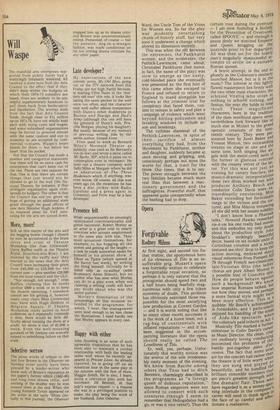Will Waspe
The manifold arts enterprises supported from public funds had a worryingly traumatic weekend. All received a stern note from the Arts Council to the effect that if they didn't keep within the budgets on which their 1974-75 subsidies are based, there are unlikely to be any helpful supplementary handouts to pull them back from bankruptcy and liquidation. The worries stem from the fact that Arts Council funds, though close to Ell million up on 1973-74, have not wholly kept pace with rising costs and wages; and some subsidised organisations may be forced to proceed almost with the same caution and eye to economy as are accepted by commercial vi.ntures. Waspe's heart bleeds for them — but better his heart than his pocket.
Not that the Council has made a positive and categorical statement that there will be no extra cash for enterprises that can't keep out of the red. There are two reasons for that. One is that there are certain things that just would not be allowed to go to the wall (the National Theatre, for instance, if that profligate organisation again overspends its budget). The other is that the Council has not yet given up hope of getting an additional state grant through the good offices of new Arts Minister Hugh Jenkins, if its renewed pleas for VAT zerorating for the arts are turned down.
More, more!
Still on this matter of the arts and the begging bowls: though I should by now be accustomed to the brass nerve and crust of Theatre Workshop (the Joan LittlewoodGerry Raffles outfit at the Theatre Royal, Stratford-atte-Bow), I am stunned by the sniffy way they reacted to the news that the Arts Council were increasing their grant from E45,000 to £55,000 for the current year — plus another E20,000 from the local council and the GLC.
"Not enough, not enough," cries Raffles, claiming that he needs another £800 a week or so to keep the theatre operating. I somehow cannot see his getting it, however many cosy chats Miss Littlewood may have with Hugh Jenkins in Be!grave Square. If Theatre Workshop really pulled in local audiences, as it repeatedly contends it does, there would be little difficulty about running the show at profit, let alone a loss of £1,500 a week. Even the well-meaning goodwill of Mr Jenkins can scarcely extend to subsidising failure on that scale.
Selective sorrow
The pious words of tribute to the late Ivor Brown in the Observer on Sunday must surely have been penned by a leader-writer who knew only of Brown's reputation as the paper's former editor (1942-48) and long-time drama critic, and nothing of the shabby way he was treated there at the end. When the young Kenneth Tynan appeared on the scene in the early 'fifties (initially in this journal), the Observer
snapped him up as its drama critic and Brown was unceremoniously retired. Pensioned, of course — but the pension, dog-in-a-manger fashion, was made conditional on his not writing drama criticism for any other paper.
Late developer?
My expectations of the new comedy series, My Old Man, going out on the ITV network from this Friday, are not high. Partly because, in starring Clive Dunn in the 'doddery old man' title role, it looks like taking the same pitcher to the well once too often, and the character may well suffer odious comparison with Dunn's other dodderers in Bootsie and Snudge and Dad's Army (although this one will have the gimmick of Dunn's wife, Priscilla Morgan, playing his daughter). But mostly because of my memory of previous writing jobs by the series author, Geratd Prow.
Frow used to work at Bernard Miles's Mermaid Theatre as publicity man (and as Sir Bernard's son-in-law) and wrote a show called Mr Burke, MP, which it pains me to contemplate even in retrospect. He later ran a theatre company with Sally Miles at Margate where he did an adaptation of The Three Musketeers which, if anything, was even worse. Of course, all this was years ago (in the meantime he has been a disc jockey with Radio Caroline and a press agent in Coventry), and Frow may be a late developer.
Presence felt
While unquestionably an amusingly opinionated conversationalist and genial raconteur, Robert Morley as an actor is a great trial to nearly everyone who accepts employment in the same play with him. They must accustom themselves, for example, to his hogging all the scenes and getting all the laughs — a task he made somewhat easier for himself in his present show. A Ghost on Tiptoe (which opened at the Savoy last week), by writing the thing himself. OiTicially he is listed only as co-author (with Rosemary Anne Sisson), but no author who has seen what Morley can do to a play even when not claiming a writing credit will have any doubt about who was the senior partner.
Morley's domination of the proceedings on this occasion extended to the programme, for which, I hear, the management were kind enough to let him chose the illustrations. 1 need hardly say that Morley appears in every one.
Happy with either
John Standing is an actor of such agreeable disposition that he has been able to maintain a cordial relationship with both the leading ladies with whom he recently appeared in Private Lives. As already reported, he is going off on an American tour in the same play in the autumn with the first of them, Maggie Smith. He is also, I learn, doing a television play with her successor, Jill Bennett, at that lady's express request — a request she was in a privileged position to make, the play being the work of her husband, John Osborne.


































 Previous page
Previous page